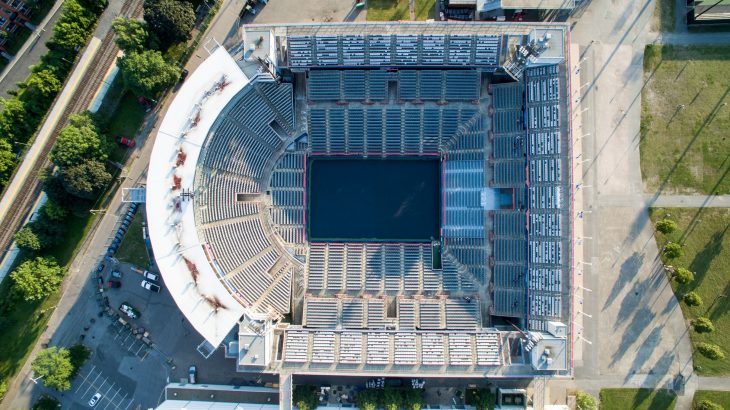
Navigating the guest experience in a post-coronavirus world
The world is about to change dramatically. Things that used to be societal norms, such as shaking hands or giving high fives, are going to be met with concern for at least the foreseeable future, if not longer. While only time will tell if these changes are permanent, we need to consider what new world we are entering and what we are leaving behind.
The attractions industry is far from exempt from the global changes we will encounter. From holding onto a lap bar or shoulder harness on a roller coaster, to putting your fingers into a bowling ball, to making skin contact on a water slide, guests are going to enter your attraction with a heightened sense of concern for cleanliness, sanitation, and ultimately their health and safety.
When it first became apparent that COVID-19 would be a large concern, it seemed that every company with an email list sent the exact same message to anyone who has ever done business with them, from office supplies stores to cable companies – I even got multiple emails from a restaurant in Europe where I dined on my honeymoon. While I didn’t have immediate plans to book another reservation, I was glad to know that they were on top of it.
But beyond this obviously copied-and-pasted form that assured us that all employees are washing their hands, what can be done to assure our guests that we will keep them clean, safe, and out of the way from this novel virus to the best we can? When the dust clears and we reopen our doors, gates, and turnstiles, there is going to be new normal based on the shock we have all experienced from this pandemic.
There are now more reasons not to visit your attraction than there were before. With an uncertain economic future, we can only anticipate that budgets will be constricted, leaving less discretionary income to visit attractions. We dealt with this during the housing crisis from 2007-2009, and combatted the economy through steep discounting, promotions, and other creative initiatives to get people out of the house and out having fun.
This crisis has brought on a new reason not to visit: confidence of your sanitation and health practices, combined with hesitancy to be part of a large group or gathering. This is potentially even more disastrous than the inevitable economic downturn to which our industry has demonstrated its resiliency. This is a new problem that we need to battle.
I’m not an expert in sanitation, so I can’t tell you how to keep your facility immaculate and germ-free. There are plenty of other resources for that. However, I can offer recommendations on how to leverage your guest experience initiatives to power through these uncertain times.
Upon reopening, the first guests who visit you are undeniably your most loyal. These are the guests that have been eagerly awaiting your reopening and they have committed, while in isolation, that your business was the first they wished to patronize when given the opportunity to leave their home. Let that sink in for a minute. Think of the alternative options that they had. These guests are special. How are you showing them that you recognize that?
This statement goes beyond your first guests back, and in fact, should dictate how your new mindset is framed, along with the mentality of every staff member in your organization. Even when the economy is booming, and the travel, tourism, and leisure industries are at an all-time high, the alternatives for visiting your attraction are limitless – from your direct competitors and any other ways for your guests to spend their leisure dollar and time.
But wait– now your competition includes fear and uncertainty, so add these to the list. That means that every single guest who voluntarily gives you money in exchange for an enjoyable experience has chosen you over visiting your competition, binge-watching Netflix, and ultimately, they have chosen you over feeling anxious about being in public, surrounded by other humans. With every single guest that you see, you have won their business over fear and uncertainty.
I often talk about the expectations that guests have, and specifically acknowledging that their expectation must be so high that it exceeds all alternative options. Now that fear and uncertainty have entered the picture, how are you going to deliver an experience that is superior to all guests’ expectations?
Let’s take a quick look at a variety of components that make up what a guest expects when they visit your attraction. By no means do I claim that this is fully comprehensive, but this is at least a general framework for what makes up a guest’s desire to visit. Your guests expect that you will be:
- Safe
- Open (during advertised hours of operation)
- Efficient
- Clean
- Well maintained
- Enjoyable
- Friendly
And ultimately, they expect that you will provide an experience that results in a long-lasting memory. Each of these expectations is now at risk due to heightened concerns that come with your guests as they walk through your doors or gates. This leaves you with the challenge of a) giving your guests a justified reason to have a high enough expectation that they decide to visit you, and b) proving the promises that you’ve made that resulted in this expectation, and determining creative ways to go above and beyond.
Let’s focus on the expectation of cleanliness. Pre-corona, this may have been more of a subtle expectation where your guests had a natural understanding that your facility was clean. To many guests, you were innocent until proven guilty. This has now reversed. Going forward, you are in an uphill battle to continuously prove to all guests at all times that sanitation is a top priority.
Think back to the countless emails we have received – odds are that your organization sent one too. This was merely the first step in an ongoing process of cleanliness communication as it relates to the guest experience. But here’s the deal: having a high cleanliness standard is one thing, but it is just as important that this standard is communicated to your guests so that they feel comfortable when they are visiting. Even if you meet and exceed CDC guidelines, if any component of your procedure is not immediately apparent, you will lose consumer confidence, which in turn will negatively affect the guest experience. The guest will not feel as satisfied with their visit, unraveling any potential upsides of enjoyment or any other expectation from the list that you may have exceeded, and their desire to return will minimize – while increasing the likelihood of a negative review online. As we all know with negative reviews, it doesn’t matter if the guest is right or wrong; when it’s posted online, it frames the expectations of other prospective guests.
When it comes to how to navigate the guest experience, there are clear parallels between this crisis and the dilemma that zoos and aquariums have been navigating since the release of Blackfish in 2013. Immediately upon its release, a wave of uncertainty draped society regarding whether animals should be kept in captivity. This caused a massive shockwave in the zoo and aquarium community, and left operators scrambling to battle the amplified concern for perception of animal care.
By analyzing reviews from TripAdvisor, Yelp, and other channels of guest feedback, I would point out to my clients that perception of animal care was a concern that needed to be addressed. When the uncertainty began to emerge, oftentimes my clients would tell me that they were unsure where this perception came from – and would proceed to describe to me their animal care procedures, how they meet or exceed AZA guidelines, and stress that every animal within their care was happy and healthy.
The problem was that I was not their audience to convince. The way that they were able to mitigate the concern had nothing to do with how well they cared for their animals – that, according to the procedures they described, was not the issue. The issue was how their animal care procedures flowed to the guest experience, ultimately resulting in how guests perceived their standard. If a guest posted a negative review online, it had nothing to do with how healthy the animals were, it was purely the perception that became reality.
With the impact of COVID-19 on consumer confidence, the most pressing issue for operators is that perception is reality. It doesn’t matter if the guest is right or wrong, or how high your standard actually is. What matters is the guests’ takeaway from what you communicated to them. If your guest has an enjoyable experience, and their perception of cleanliness and sanitation is high, consumer confidence is restored, which in turn results in positive word of mouth, and increased desire to visit again. The positive impression is crucial to the economic recovery of your business, and that impression is 100% embedded into the guest experience.
Here are a few ways to protect consumer confidence in cleanliness:
- Send that email everyone is sending
- Post a notification on your website
- Communicate what the standard has always been
- Use data to demonstrate that cleanliness has always been top of mind
- Stress the importance to staff to communicate the standard to your guests
- Ensure that your staff speak with confidence when asked about cleanliness procedures, whether via phone, email, or in person
- Have staff members regularly cleaning in guest view during regular hours of operation
- Keep restroom cleaning supplies and sanitizer fully stocked
- Give guests the opportunity to communicate directly if supplies are not fully stocked or if certain areas are not as clean as expected
- Provide hand sanitizer dispensers at critical points where physical contact is required
This is just a starting point for any best practices that will apply best to your operation.
From a guest experience standpoint, the way that we will navigate this crisis is by focusing on your guests’ perception of your sanitation standards as much as you focus on implementing the standards themselves. This is crucial at all levels of employment, and most important to stress to staff members on the front line, who are responsible for maintaining and exceeding your guests’ expectations on a daily basis.
Josh Liebman
Josh Liebman specializes in guest experience within attractions, tourism, and hospitality, including service standards, complaint resolution, and driving guest loyalty. Josh is a serial entrepreneur, podcaster, consultant, and speaker. Josh has worked for some of the top attraction operators in the world, including, but not limited to Walt Disney World, Universal Orlando, Merlin Entertainments, and Cedar Fair. Josh has been integral to the openings of multiple attractions in various leadership capacities. Additionally, Josh has consulted for many of the world’s leading hospitality brands, including Ritz Carlton, Four Seasons, Waldorf Astoria, and many more. Josh is Co-Host of the AttractionPros Podcast, which brings the audience into the room with the top leaders, executives, and influencers in the attractions industry.
